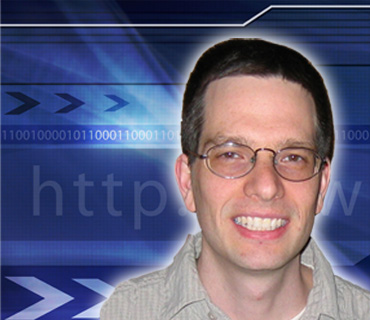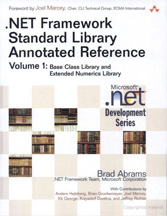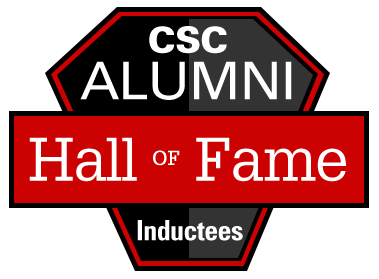 Every time you use a new application for Microsoft Windows, you might want to thank Brad Abrams.� A Product Unit Manager for Microsoft, Abrams is part of the engineering team that designs the .NET Framework, the tools that help build new applications.� �This is important to Microsoft, as it helps build our tools business as well as our platform services,� says Abrams, who regularly blogs at http://blogs.msdn.com/brada/.
Every time you use a new application for Microsoft Windows, you might want to thank Brad Abrams.� A Product Unit Manager for Microsoft, Abrams is part of the engineering team that designs the .NET Framework, the tools that help build new applications.� �This is important to Microsoft, as it helps build our tools business as well as our platform services,� says Abrams, who regularly blogs at http://blogs.msdn.com/brada/.
A graduate of NC State�s class of 1997, Abrams lead a group of software developers and quality assurance managers who deliver features for the dynamic frameworks that Microsoft offers.� �Every day, I�m online with developers,� Abrams says.� �We�re not building applications that consumers will use � we�re building tools that make it easier to build applications.�
At Microsoft, he�s part of a team of 60 people responsible for figuring out features and working with developers on the frameworks, which he says are used by almost every Fortune 500 company.� �Our main objective is reducing the time it takes to build applications,� he says.� �If they want to build out an application to track inventory, their internal IT department can build it much more quickly�.�
�We specialize in what�s called �the plumbing code� � the system that every application needs, but is not necessarily specific to their business.� I really enjoy working directly with developers � it keeps me very well grounded.�
His work has been honored by Microsoft�s highest honor, the Chairman�s Award for Engineering Excellence, which he received in 2007.� The award, presented by Bill Gates, was for Abrams� work on FxCop, an application that enables developers to quickly and reliably scan their code to help catch errors before they become part of the source tree.�
Abrams says that while it took several years for FxCop to make an impact, the award was �a great honor� that helped validate his hard work.� �It certainly helped to reaffirm that persistence can pay off in the end!�
Abrams became interested in �the creativity you can have with software� at a young age: �There are no physical constraints as to what you can accomplish with software.�� While at NC State, cooped at Northern Telecom for two semesters, followed by two semesters interning at Microsoft.� After graduation, he moved out to Seattle to work at Microsoft full time.� �It was sunny and in the 70s when I interned,� he says with a laugh.� �Then I came out here and it rained for 100 days straight!�
Abrams credits NC State with giving him �technical grounding� in the fundamentals of computer science.� �I came out of school with a really solid basis in computer science and how programming works,� he says.� �That helped me gain a lot of credibility with my peers who had been at the company a lot longer.�
He also credits the many different courses he took at NC State, including a course in economics.� �I fell in love with reading the front page of The Wall Street Journal and seeing how what happens in other businesses affects the others,� he says. A course in communications proved useful in his work at Microsoft: �Ninety percent of my job is communications, so it really helped to have some background in that.�
Abrams says Microsoft is a place full of �smart people who are very passionate about what they work on.��� �It�s very much an environment where what you can contribute is the most important thing�
 For the company, Abrams authored the 2004 book Framework Design Guidelines.� The book, which deals with framework design guidelines, recently published a second edition.� �The style of the book is �dos� and �do nots,� and we mixed it up with annotations from people who are respected in the industry,� says Abrams, who adds that he wants the book to be �timeless.��
For the company, Abrams authored the 2004 book Framework Design Guidelines.� The book, which deals with framework design guidelines, recently published a second edition.� �The style of the book is �dos� and �do nots,� and we mixed it up with annotations from people who are respected in the industry,� says Abrams, who adds that he wants the book to be �timeless.��
�What I liked about it was the discussion about what did and did not make good guidelines � it gave it some color and personality, so it wasn�t just black and white.�� The second edition of the book was updated for the new tools and guidelines found in the new version of the framework,� and features new examples and a lot more real-world experience.�
When he�s not building the .NET Framework, Abrams is busy building �trains and towers� with his two young sons.� Just as he helps build the framework for new applications, he encourages current NC State students to think about building a variety of work and life experiences outside of the Computer Science program.
�I would definitely encourage people coming out of the computer science program to think broadly about the kind of experiences they need to have,� Abrams says.� �It�s less valuable to just understand programming and algorithms than to also have people skills and communication talents.�
And he warns them that it�s a different experience to work on a large-scale project.� �The biggest thing I worked on at NC State was a four-person project � you�re lucky to have anything in the industry with less than a forty-person team,� he says.� �So being able to work on a larger project is definitely important."
~Smith~

